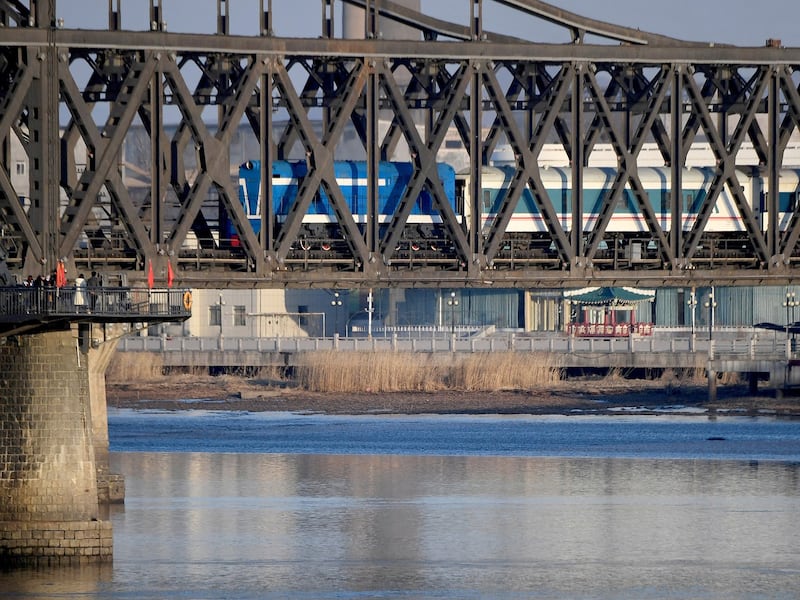North Korea and China resumed cross-border rail freight shipments on Monday, promising much needed relief to desperate North Koreans suffering from food shortages and economic upheaval under a trade ban that had been put in place in response to the coronavirus pandemic.
Trains are once again moving from Dandong, China, across the Yalu River border to Sinuiju, North Korea, and business is booming, sources in North Korea and China told RFA.
“Since the end of October, trading companies have been busy transporting various materials to the Sinuiju and Uiju areas to prepare them for export to China,” an official working at a trade agency in Sinuiju’s surrounding North Pyongan province told RFA’s Korean Service Oct. 31.
“They are also drawing up contracts with their Chinese counterparts for materials to be imported from China,” said the source, who requested anonymity for security reasons.
Prior to the closure of the Sino-Korean border in January 2020, China had accounted for more than 90 percent of North Korea’s annual international trade. The sudden stoppage in trade wrecked the North Korean economy. Entire towns saw their commercial activity dry up as freight ships rusted in their harbors from disuse. People who had made a living through the purchase and sale of goods from China were left with no way to support themselves.
The trade ban’s cascading effect ultimately led to food shortages, as a lack of farming equipment, fertilizers and pesticides led to lower-than-expected crop yields. Flooding in the Korean peninsula over two consecutive summers compounded the problem, pushing farm outputs even lower. And with the border closed, food imports from China were not available to help match demand with supply, raising fears of mass starvation.
The U.N.’s Food and Agriculture Organization estimated in a recent report that North Korea would be short about 860,000 tons of food this year, or about two months of normal demand.
Starvation deaths have been reported, and residents were told to prepare for a food crisis similar to the 1994-1998 famine that killed as much as 10 percent of the population, according to some estimates.

Authorities had been reluctant to reopen the border despite the deteriorating economic situation out of fear that a resumption of trade could spread the coronavirus and endanger public health in the capital Pyongyang. Prior to the pandemic, rail freight from China was processed at Pyongyang’s Seopo Station before heading to its destination.
But a new quarantine and cargo processing facility in Uiju, about 14 miles east of Sinuiju, will ensure that freight from China is safe before it is distributed within North Korea, an official from another North Pyongan trade agency told RFA.
RFA reported in March that the new line was built from Sinuiju, across the river from Dandong, to Uiju, and its new processing facility.
All international freight from China will come from Dandong and proceed to Uiju for processing, said the second source, who requested anonymity to speak freely.
“Imports from China must stop at Uiju station for customs and disinfection, then move to the quarantine facility for a one-week period before they can be distributed to other areas in North Korea,” said the second source.
Though cross-border rail freight has resumed, transporting freight on trucks is still restricted, a North Korean trade worker in Dandong told RFA.
“Train freight has little human contact, so the freight quarantine will prevent any problems with the coronavirus. On the other hand, if truck traffic resumes through the Dandong-Sinuiju customs office, hundreds of truck drivers will have to come and go every day,” said the trade worker.
“That would be a huge risk and could cause problems if they were to spread the coronavirus.”
Shipments of medical supplies from China to North Korea by the World Health Organization resumed in late September.
North Korea also covertly accepted food aid by train from China in April, when a freight train loaded with Chinese corn left Dandong for Sinuiju under cover of night.
Sources in Dandong told RFA that the corn had been declared as animal feed.
Reported by Hyemin Sohn for RFA’s Korean Service. Translated by Claire Lee. Written in English by Eugene Whong.
